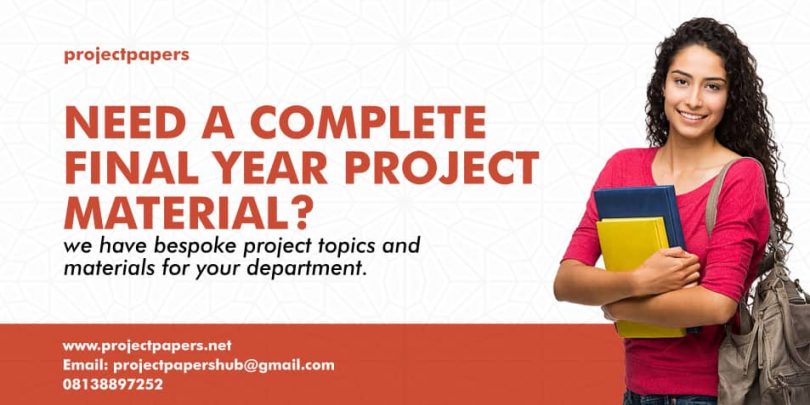Advertisements
Attitude of Technical and Vocational Students Towards Students’ Industrial Work Experience(SIWE)
Content Structure of Attitude of Technical and Vocational Students Towards Students’ Industrial Work Experience(SIWE)
- The abstract contains the research problem, the objectives, methodology, results, and recommendations
- Chapter one of this thesis or project materials contains the background to the study, the research problem, the research questions, research objectives, research hypotheses, significance of the study, the scope of the study, organization of the study, and the operational definition of terms.
- Chapter two contains relevant literature on the issue under investigation. The chapter is divided into five parts which are the conceptual review, theoretical review, empirical review, conceptual framework, and gaps in research
- Chapter three contains the research design, study area, population, sample size and sampling technique, validity, reliability, source of data, operationalization of variables, research models, and data analysis method
- Chapter four contains the data analysis and the discussion of the findings
- Chapter five contains the summary of findings, conclusions, recommendations, contributions to knowledge, and recommendations for further studies.
- References: The references are in APA
- Questionnaire.
Overview of Attitude of Technical and Vocational Students Towards Students’ Industrial Work Experience(SIWE)
LITERATURE REVIEW
This chapter deals with the literature review and the research materials are reviewed and organized under the following sub-headings:
- An Overview background of the Students Industrial Work Experience Scheme (SIWES)
- Objectives of SIWES
- Bodies Involved in the Management of SIWES
- Guidelines on SIWES Programme
- Indigenous orientation of SIWES as tool for a sustainable society/Development.
- Conceptual and Theoretical Framework
- Attitude of students towards SIWES
- Problems of Manpower Production In Technical And Vocational Education (TVE) In Nigeria
- Approaches to Improving Manpower Production In Technical And Vocational Education
- Summary of Reviewed Literature
An Overview background of the Students Industrial Work Experience Scheme (SIWES)
The government’s decree No. 47 of 8th Oct; 1971 as amended in 1990, highlighted the capacity building of human resources in industry, commerce and government through training and retraining of workers in order to effectively provide the much needed high quality goods and services in a dynamic economy as ours (Jemerigbe, 2003). This decree led to the establishment of Industrial Training Fund (ITF) in 1973/1974. The growing concern among our industrialists that graduates of our institutions of Higher learning, lack adequate practical background studies preparatory for employment in industries, led to the formation of students Industrial Work Experience Scheme (SIWES) by ITF in 1993/1994 (Information and Guideline for SIWES, 2002). ITF has as one of its key functions; (1) to work as co-operative entity with industry and commerce where students in institutions of higher learning can undertake mid-career work experience attachment in industries which are compatible with students area of study (Okorie 2002, in Asikadi 2003).
The students Industrial Work Experience Scheme (SIWES) is a skill Training programme designed to expose and prepare students of Education, Agriculture, Engineering, Technology, Environmental, Science, Medical Sciences and pure and applied science for the Industrial work situation which they likely to meet after graduation. Duration of SIWES is four months in Polytechnics at the end of NDI, four months in College of Education at the end of NCE II and six months in the Universities at the end of 300 or 400 or 500 levels depending on the discipline (Information and Guideline for SIWES, 2002).
Objectives of SIWES
The objectives of SIWES among others includes to:-
- Provide an avenue for students in institutions of higher learning to acquire industrial skills and experience in their approved course of study;
- Prepare students for the industrial works situation which they are likely to meet after graduation.
- Expose students to work methods and techniques in handling equipment and machinery not available in their institutions.
- Provide students with an opportunity to apply their knowledge in real work situation thereby bridging the gap between theory and practices.
- Enlist and strengthen employers’ involvement in the entire educational process and prepare students for employment in Industry and Commerce (Information and Guideline for SIWES, 2002).
Bodies Involved in the Management of SIWES
The bodies involved are: Federal Government, Industrial Training Fund (ITF), Other Supervising Agencies are: National University Commission (NUC), National Board for Technical Education (NBTE) & National Council for Colleges of Education (NCCE). The functions of these agencies above include among others to:
Advertisements
- Ensure adequate funding of the scheme;
- Establish SIWES and accredit SIWES unit in the approved institutions;
- Formulate policies ad guideline for participating bodies and institutions as well as appointing SIWES coordinators and supporting staff;
- Supervise students at their places of attachment and sign their log-book and ITF Forms;
- Vet and process students log-books and forward same to ITF Area office;
- Ensure payment of Allowances for the students and supervisors.
Therefore the success or otherwise of the SIWES depends on the efficiency of the Ministries, ITF, Institutions, Employers of labour and the general public involved in articulation and management of the programme. Thus the evaluation of SIWES in tertiary institutions in meeting up with the needs for the establishment of the programme is necessary.
Guidelines on SIWES Programme
For the smooth operation of the SIWES, the following guidelines shall apply:
Advertisements


